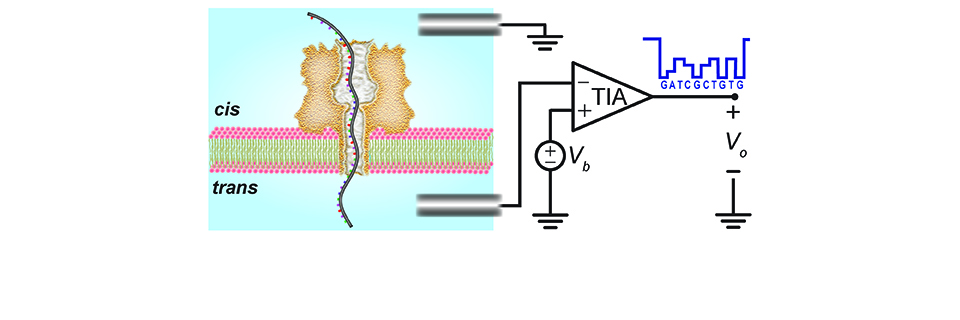Prof. Hall gave a talk at the Google Ara Developers Conference, watch it here.
Teacher of the Year Award
Prof. Hall was selected as the best undergraduate teacher of year for the Department of Electrical and Computer Engineering for the 2013-2014 academic year! Read more about it and some of the students’ comments here.
BioCAS Papers
Alex (poster) and Edwin’s (oral) work was accepted for presentation at BioCAS 2014 in Lausanne, Switzerland.


Nanopore Research
This project aims to integrate CMOS electronics with a versatile single molecule detector, the nanopore. Biomolecules, such as deoxyribonucleic acid (DNA) or proteins, can be guided through a nanoscale aperture (referred to as a nanopore) one molecule at a time, resulting in signatures that reveal characteristics of the passing molecule. As single-stranded DNA translocates through a nanopore, each nucleotide induces a blockage in the ionic channel, creating a unique current signature. However, the fast translocation speed of 1-10 nucleotides per microsecond and small current changes of 1-10 picoampere, which are superimposed on a much larger baseline current of 1000 picoampere, pose significant technical challenges on the measurement circuitry design. In the Hall group, we are researching how to design low-noise and high-speed transimpedance amplifiers to sense these minute current signatures. An inexpensive single molecule biosensor will have a tremendous impact in areas as diverse as medicine and health, both domestically and abroad.

mobile Health (mHealth) Research
With a significant increase in the availability of portable and network connected devices over the last few decades, the infrastructure already exists to be able to integrate medical diagnostic tools with mobile technology. Taking advantage of this opportunity, the Hall research group is working on developing low-cost, point-of-care (POC) biosensor devices, which allow users to test biological samples, analyze data, and aggregate the results for study by medical professionals all without the need for a centralized laboratory or bulky and expensive equipment. There are several projects currently in progress that fall under the umbrella of mobile Health (mHealth).
With the focus on leveraging the functionality and widespread use of the smartphone, especially in developing countries, we are designing two versions of a low-cost smartphone-based biosensor. The first is a low-power, single-channel potentiostat to be used for electrochemical assays and the second is a wireless, multiplexed version with added sensors. We are also working in partnership with industry to integrate biosensor modules directly with smartphone hardware. On the transducer and bio-chemistry side, we are investigating novel methods of functionalizing electrodes that decrease the cost per disposable test strip making these POC devices more practical. Finally, the compact and low-cost nature of electrochemical techniques has allowed us to combine our electrochemical biosensors with optical biosensors for improved detection on Lab-on-Chip type devices.
Qualcomm Institute seed grant awarded
Our proposal titled “Rapid, Ultralow-Cost Multiplexed Point-of-Care (POC) Testing of Infectious Diseases for Global Health” was awarded as part of the CalIt2 Strategic Research Opportunities (CSRO) program. Read more about it here.
CTRI Galvanizing Engineering in Medicine (GEM) seed grant awarded
The BioEE group and Dr. Doug Conrad were awarded a grant to develop a smartphone-based biosensor to monitor pH and pulmonary exacerbation biomarkers in patients with cystic fibrosis (CF). Read more here.

